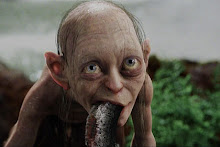Let's say you were sick, very very sick. The doctor had two different medications to choose from. Two almost opposite medications. He showed you the following graph of their effectiveness on various patients.
 Which medication would you choose?
Which medication would you choose?I think most sane people would choose Medication 1. It appears to be clearly more effective than Medication 2. After all, only one subject taking Medication1 did worse than the best one on Medication 2.
OK.
Now, let's look at an identical graph but instead of medications 1 or 2, we have an increase in tax burden or a decrease in tax burden. And instead of an increase in life, we have an increase in real GDP per capita.
 Same figure, different labels. This figure is based on data from the Bureau of Economic Analysis’ National Income and Product Accounts (NIPA) tables. Both of these figures are from a post at Angry Bear. I recommend that you read it.
Same figure, different labels. This figure is based on data from the Bureau of Economic Analysis’ National Income and Product Accounts (NIPA) tables. Both of these figures are from a post at Angry Bear. I recommend that you read it.Clearly, raising the tax burden is more beneficial to the economy than reducing the tax burden.






Raising the taxes on the rich will make everyone in the 99 percentile's life better...because those fuckers saw their net worth raise by a whopping 17-fucking-percent in 2009.
ReplyDeleteObviously, the bastards can afford to pay more..to me its a no-friggin-brainer.
I agree with Dusty, every word of it! LOL
ReplyDeleteDidn't Kennedy cut taxes late in his term?
ReplyDeleteJFK also closed loopholes so, at least for people in his tax bracket, the tax burden went up.
ReplyDeleteThanks for this post, Jerry. As a result, I've added AngryBear to my blogroll. This reinforces your point of a few posts back on the subject of taxation.
ReplyDeletePresident Obama should have pushed for an immediate repeal of the Bush tax cuts, instead, they are still in effect. This despite the fact that he's constantly pointing out that Republican economic policies haven't worked. What gives?
ReplyDeleteObama decided to let the tax cuts lapse after 2010 rather than provoke a battle over taxes at the outset of his administration. Because the 2009 budget was approved early in 2008, there wasn't much point in major battle over something that was going to expire a year after anyway.
ReplyDeleteAlso, you have to consider virtually every early decision in the context of the health care law. At the time, the administration and the congressional Democrats still hoped for support from Collins, Snowe, and Grassley. (The blueprint for the final legislation was essentially Grassley's response to Clinton's plan.) In hindsight, we know they weren't going to get it, but that's hindsight.
Finally, congressional Democrats weren't big on repealing the Bush cuts, again because they did not see the gain as being worth the effort. It would have been difficult for Obama to undertake something that his own party was unenthused about.
I just thought of you as I listen to the audiobook 'A New Earth' by Eckhart Tolle.
ReplyDeleteHe says Most Politicians are Clever but Few are Intelligent.. lol.
He first says "The Ego might be clever but it is not intelligent" Cleverness pursuits its own little aims. Intelligence sees the whole picture."Cleverness is motivated by self interest and extremely short sighted.
He talks a lot about the ego in his books.
Do you think another synonym for 'Ego' is 'Republican'??
hugs.
BettyAnn
Thanks for sharing... passing this on to my parents. They could use some enlightenment on the subject !
ReplyDeleteYou've been in rather a fiesty mood of late.
ReplyDeleteKeep up the good work! :-)
In the 1950s the top tax bracket was about 90%. The economy boomed, and the rich did not want for luxuries.
ReplyDeleteTC-- Plus, union membership was at its zenith and bankers made the same money as everyone else. The high tax bracket encouraged business owners to reinvest in their companies and take out profits in dividends or capital gains, both of which encouraged a long view.
ReplyDeleteGood points, K. Back then banking was about financing value. Today it is about speculating in paper.
ReplyDelete